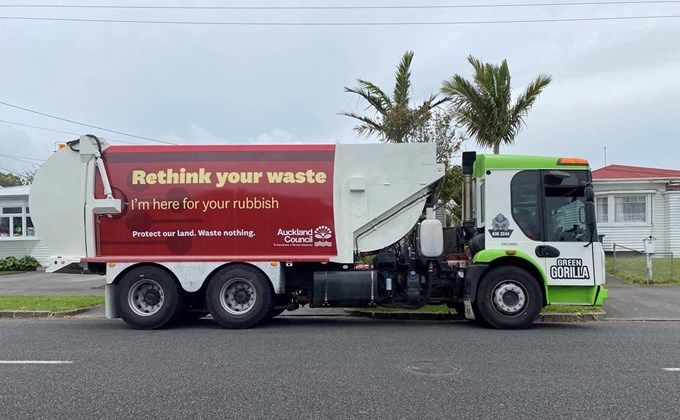Auckland Council is reassuring larger families that its proposal to move from weekly to fortnightly rubbish collections offers options for larger households to manage their waste needs.
The draft Waste Management and Minimisation Plan 2024, currently open for public consultation until 28 March, proposes moving from weekly to fortnightly rubbish collections across Auckland from July 2026.
Auckland Council General Manager Waste Solutions Parul Sood says that although most households will comfortably make do with fortnightly rubbish collections, especially if they are using their food scraps bin and recycling bin correctly, the Plan accounts for larger households that may struggle with a fortnightly rubbish collection.
“If you live in an extended family situation, for example, and find your rubbish bin start to overflow regularly, you have the option of ordering a larger 240L rubbish bin from the council,” Sood says.
“You can also order an extra food scraps bin or larger recycling bin with no extra charge to your rates bill.”
Sood adds that although ordering the larger rubbish bin will cost the household slightly more than the smaller one under targeted rates (as is the case now), all ratepayers will save money if the switch to a fortnightly rubbish collection goes ahead as proposed, made possible by what’s been achieved by Aucklanders so far.
“Over the last 12 years Aucklanders have already reduced the amount of waste they’ve sent to landfill by 10,000 tonnes. That’s something to be incredibly proud of as it reflects solid progress towards our zero waste goal. If we continue to work together, we can and will reach zero waste by 2040.
“Research from here and abroad shows that moving to fortnightly rubbish collections motivates people to optimise the use of their three kerbside bins. We expect fortnightly collections will reduce the amount of waste sent to landfill by around 32,000 tonnes per year. This is over and above what we are already diverting through the food scraps service,” says Ms Sood.
Under the proposal, fortnightly rubbish collections would take place on alternate weeks to kerbside recycling, with the food scraps collection to remain a weekly service.
“We’re also actively expanding the resource recovery network across Tāmaki Makaurau, which currently includes 13 community recycling centres, where you can take excess recyclable and inorganic items.”
Close to 20 councils around New Zealand have already moved to fortnightly collections, including Christchurch City Council which has had fortnightly collections for more than 15 years.
Experiences here and overseas have shown that fortnightly collections have resulted in large decreases in waste to landfill, without a corresponding increase in illegal dumping or littering; Hamilton and Tauranga have halved their kerbside waste to landfill since introducing fortnightly collections in recent years.
Audits of Auckland’s rubbish bins before the food scraps collection rollout show that close to two-thirds of bin contents by weight could have been diverted from landfill through recycling or composting. Only 35 per cent of the contents was comprised of waste that needs to go to landfill.
Benefits of moving to fortnightly rubbish collection
-
Reduces waste to landfill. Fortnightly rubbish collections are expected to reduce the amount of waste we send to landfill by around 32,000 tonnes per year.
-
Effective use of recycling and food scraps bins makes better use of materials. Recycling materials reduces the need to extract new materials from the ground, saving carbon in production of those materials.
-
Composting or anaerobically digesting food scraps turns waste to energy and returns nutrients to the soil.
-
Cost savings from reduced collection frequency which would be passed on to ratepayers.
-
Fewer bins on the kerbside at any one time because you will put your recycling and rubbish bins out for collection on alternating weeks.
-
Fewer trucks on the road because rubbish will not be collected every week, reducing congestion and emitting less greenhouse gases.
-
Recycling also supports a greater number of jobs in our economy than landfilling operations.
-
Reduces greenhouse gas emissions both from landfills and from keeping materials in circulation.
Have your say
Aucklanders have until 28 March to have their say on the draft Waste Management and Minimisation Plan (WMMP) 2024 and the Draft Hauraki Gulf Islands Waste Plan 2024.
To have your say, you can:
-
complete our online feedback form
-
attend the Regional organisation/interest group event or Māori organisation events
-
scan and email your completed form to wasteplan2024@aucklandcouncil.govt.nz
-
hand your completed form in at your local library with council services
-
attend a face-to-face event


